#HMS Verdun
Text
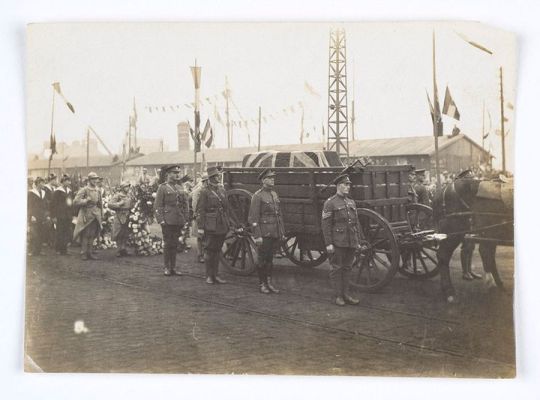
The coffin of an unknown soldier is prepared to embark for England
46 notes
·
View notes
Text
Admiral Schank and the “Sliding Keel"
John Schank (1740 -1823) was a British sailor who was very skilled at mechanical design and constructed a cot fitted with pulleys that allowed it to be adjusted by the person lying in it. this won him the nickname “Old Purchase”, from the navy term for using a block and tackle to gain mechanical advantage.
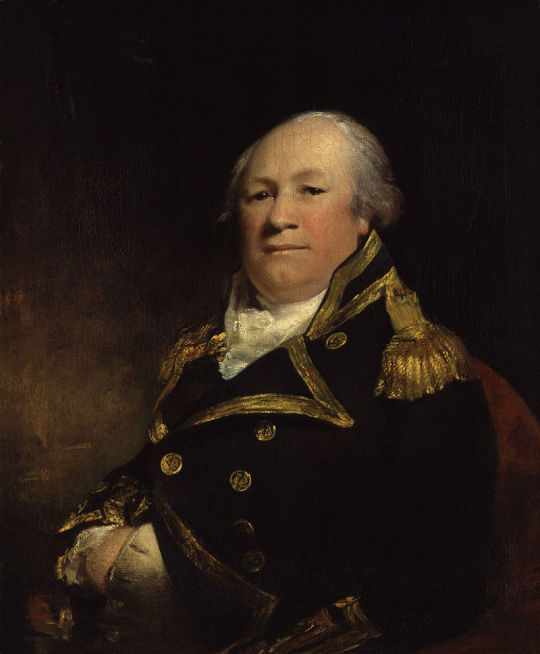
Admiral John Schank by John James Masquerier 1799 (x)
Schank was one of the tiny handful of sailors who made the transition from the lower deck to flag rank. He joined the Royal Navy at an early age during the American War of Independence he was placed in charge of local building of ships to battle the revolutionaries on the Great Lakes.
He was the first person in the western world to advocate the use of a keel that would slide through the centre of the boat and could be raised when not in use. This board made the ships faster, easier to manoeuvre in shallow waters and they could no longer drift sideways so quickly. On his return to England, Schank convinced the navy of the value of adjustable keels, and a number of vessels incorporating this feature, most notably Lady Nelson, were built. She was sent on a two years expedition to chart the southeast coast of Australia, and was involved in the founding of a number of settlements there, including Melbourne and Hobart. However, the sliding keels did have some problems with leakage and jamming, and for a time they went out of favour.
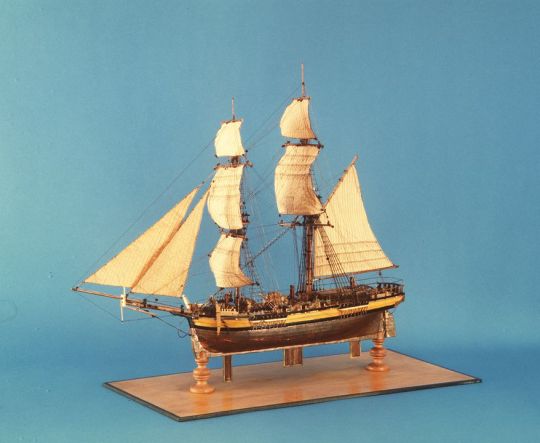
Ship Model, 1799 HMS 'Lady Nelson' with her three boards (x)
Captain Molyneaux Shuldham came up with some modifications in 1809. He was a prisoner of war held by the French in Verdun, but he smuggled out a model of what he called his revolving keel. It was exhibited at the Adelaid Gallery in London, where it came ti be noticed of three brothers from New Jersey, who in 1811 patented it in the US as the centre board. This was quickly taken up and vecame a standard feature on 80% of America's enormous coastal fleet. In due course American yachtsmen saw its advantages, but few British racers took it on. An accident in 1876 was a tragic setback, however, Mohawk, a 43m schooner, had her precarious 1,8m draught made safe by a larg 9,5m centre board. Anchored off Staten Island during the preliminaries of the America's Cup, she was just setting sail for a laisure cruise when she was hit by a squall. Her centre board had not been lowered and she capsized and sank; the vice commodore of the New York Yacht Club and all his guests died.
More improvements came over the years, and now the centre board, based on Schank's pioneering idea of a sliding keel, is standard fitting on yachting vessels.
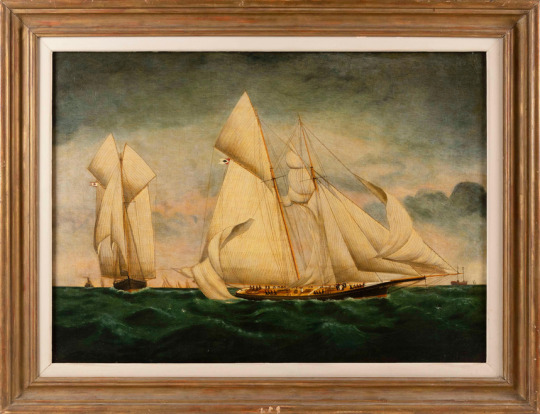
Dauntless and Mohawk racing, October 26, 1875, by William Yorke (1817-c. 1888) (x)
Schank himself died on 6 February 1823, fellow of the Royal Society and Admiral of the Blue. Mount Schank and Cape Schank, Australia, were named in his honour in 1800 by Lieutenant James Grant during his exploratory voyage while commanding Lady Nelson.
41 notes
·
View notes
Text
Events 12.18 (before 1940)
1118 – The city of Zaragoza is conquered by king Alfonso I of Aragon from the Almoravid.
1271 – Kublai Khan renames his empire "Yuan" (元 yuán), officially marking the start of the Yuan dynasty of Mongolia and China.
1499 – A rebellion breaks out in Alpujarras in response to the forced conversions of Muslims in Spain.
1622 – Portuguese forces score a military victory over the Kingdom of Kongo at the Battle of Mbumbi in present-day Angola.
1655 – The Whitehall Conference ends with the determination that there was no law preventing Jews from re-entering England after the Edict of Expulsion of 1290.
1777 – The United States celebrates its first Thanksgiving, marking the recent victory by the American rebels over British General John Burgoyne at Saratoga in October.
1787 – New Jersey becomes the third state to ratify the U.S. Constitution.
1793 – Surrender of the frigate La Lutine by French Royalists to Lord Samuel Hood; renamed HMS Lutine, she later becomes a famous treasure wreck.
1833 – The national anthem of the Russian Empire, "God Save the Tsar!", is first performed.
1854 – The Legislative Assembly of the Province of Canada abolishes the seigneurial system.
1865 – US Secretary of State William Seward proclaims the adoption of the Thirteenth Amendment, prohibiting slavery throughout the United States.
1867 – A magnitude 7.0 earthquakes strikes off the coast of Taiwan, triggering a tsunami and killing at least 580 people.
1878 – The Al-Thani family become the rulers of the state of Qatar.
1892 – Premiere performance of The Nutcracker by Pyotr Ilyich Tchaikovsky in Saint Petersburg, Russia.
1898 – Gaston de Chasseloup-Laubat sets the first officially recognized land speed record of 63.159 km/h (39.245 mph) in a Jeantaud electric car.
1916 – World War I: The Battle of Verdun ends when the second French offensive pushes the Germans back two or three kilometres, causing them to cease their attacks.
1917 – The resolution containing the language of the Eighteenth Amendment to enact Prohibition is passed by the United States Congress.
1932 – The Chicago Bears defeat the Portsmouth Spartans in the first NFL playoff game to win the NFL Championship.
1935 – The Lanka Sama Samaja Party is founded in Ceylon.
1939 – World War II: The Battle of the Heligoland Bight, the first major air battle of the war, takes place.
0 notes
Text

On November 11th 1920, a secret military operation was concluded in London. The remains of six British soldiers had been exhumed from makeshift WWI graves along the Western Front. One was chosen at random and the others were reburied. 1,000 French children stood in silence as the coffin was loaded onto HMS Verdun before it departed for England. It was received at Dover with full military honours and a 19-gun salute and then boarded on a train to London.
And then, on the morning of November 11th, the casket was taken by gun carriage to Westminster Abbey where the Unknown Warrior was buried in soil taken from the battlefields of France. 100 women who had lost their husbands and their sons attended the service. And so now, the descendants of half a million soldiers whose remains were never identified could believe that the Unknown Warrior could be their relative.
Jesus never came to explain away suffering but to fill it with his presence. He laid down his life for the enmity and hatred of man’s inhumanity to man and those rose again on the third day. These are the words of Jesus “I am the resurrection and the life. The ones who believe in me will live, even though they die”
0 notes
Photo
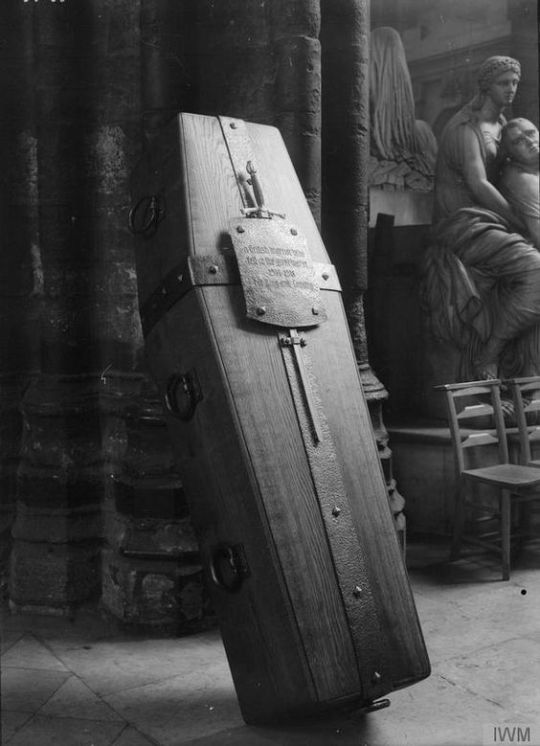
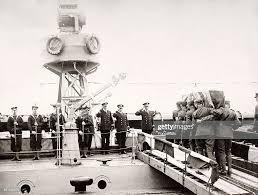
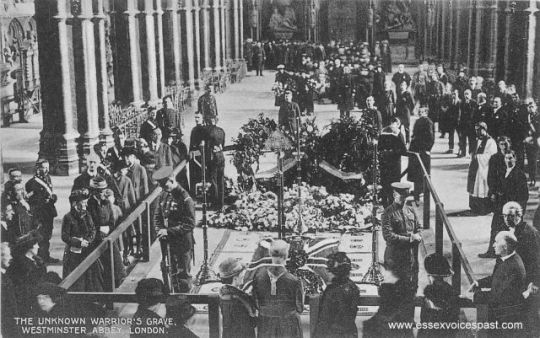
The Unknown Warrior: The coffin was placed into a casket of oak timbers from Hampton Court Palace before being banded with iron, and a medieval crusader's sword chosen by George V from the Royal Collection was affixed to the top and surmounted by an iron shield bearing the inscription 'A British Warrior who fell in the Great War 1914–1918 for King and Country'.
At the quayside, Marshall Foch saluted the casket before it was carried up the gangway of HMS Verdun, and piped aboard with an Admiral's call. The Verdun slipped anchor just before noon and was joined by an escort of six battleships.
On approaching Dover Castle it received a 19-gun Field Marshal's salute.
The coffin was then interred in the far western end of the Nave, in soil brought from each of the main battlefields, and covered with a silk pall. Servicemen from the armed forces stood guard as tens of thousands of mourners filed silently past. The grave was then capped with a black Belgian marble stone and is the only tombstone in the Abbey on which it is forbidden to walk.
Sources: IWM, wikipedia, essexvoicespast.com, getty images
24 notes
·
View notes
Text

(( Now that I’ve done my mourning for Wildstar and feel productive again: I’m still quietly working on finishing these memory sequences about Atleion’s childhood leading up to the Ravaging of Arboria, because I am still a nerd, and I like exploring his upbringing. This is Story #3, and part 1 of 2 of a particular story. The next one coming up continues directly off of this one, for anyone who likes to read these~ I’ve been writing relevant memories in order. It’s a loose narrative structure, I know, but they all connect. C’:
I’ll finish a picture someday ... Someday. *wistfully looks into the distance of sketches and lined pictures yet uncolored*. In the meantime, a quick sketch of Atleion when he wasn’t an incredibly troubled boy putting himself in too many dangerous situations. I’ll save the proper story header for next time~ ))
The gentle tickle of grass against his skin was like a warm embrace. He could feel each tiny gust of wind drifting through the forest. Like some great beast's breath, it washed over him in steady waves, always carrying the fragrant scent of the woods.
Atleion could have laid upon the ground forever, basking in the glow of the sun peaking through the branches. It was calm, quiet, as the forest often was. The serenade of distant animal calls, and the dabble of the river rushing from the far off mountains, lulled him to a drowsy near-slumber.
He may well have fallen asleep had it not been for a sudden weight dropped onto his small body. It knocked the breath from his lungs, eliciting a sharp wheeze.
"Come on, lazy! If we don't keep moving, we're never going to get back before Shaderoot notices."
Atleion's eyes, dark as soot, opened up wide. The world around him was a brightened blur of spire-like trees stretching up into a patchwork canopy. However, placed squarely within his view, was something quite different from a tree.
It was Elyia, adorned in her snowy white shawl, and her finely knit tunic. Her dusky skin caught the shadows of the branches, and her silvery gaze twinkled with the light of adventure.
The weight upon his stomach returned, more forceful and insistent, as Elyia shook him with her foot. She waved a hand above his face for good measure, then took a step back. Like a clock's pendulum, her woolen white tail swayed to a steady, unheard beat.
"It's not much further. Promise!" She beamed. Without another word, she spun on her heels and disappeared from his field of view.
Atleion caught his breath. With a smile spread over his face, he sat up and adjusted his thick poncho over his small frame. Blue, white, and elaborate, it carried the swirling patterns of old decorative symbols common to his people.
"It was only a minute!", Atleion called out. On his feet, he dusted grass off of his knees. He shook his head, sending the unruly mop of curls upon it into a frenzy. His lush purple hair tangled up, right to the tip of his ponytail. With one forceful swing, his tail dislodged the rest of the loose grass clinging to his fur, and he scampered off after his companion.
"A minute! You almost fell asleep." Elyia protested. She paused by the edge of the slow moving river in front of them. Her bare toes touched the water, curling against the soft dirt.
Though Atleion opened his mouth to protest such an assertion, he knew her to be right. It was all he could do to offer her a sheepish smile when she looked back to him, for he had delayed their journey long enough.
"Got you~" Elyia chirped. Her voice carried like a lofty bird's.
Without further warning, she grasped his hand within her own and set off once more. Her feet nimbly touched the large stones protruding from the river's currents. One after the other, she hopped along them, tugging Atleion in tow, until they safely reached the banks of the other side. Even as Atleion stumbled, sliding into the water, she never once relinquished him to the currents.
His fingers wrapped about Elyia's hand, holding it tightly. He could feel the racing of his heart within his chest. It rose like a leaf on the wind, carried higher the faster the two of them moved through the forest's dense depths.
Before long, the two young Aurin came to a stop. Each of their ears rose high, pointed forward at the silence to surround them. Not even the call of beasts rang within this part of the forest, nor the howl of the wind. It was as if the world had frozen in time.
Stretched before them was a tunnel of foliage and stone. The thicket appeared to go on forever, shadowy, dark, and foreboding. The branches of the brush reached down like monstrous teeth, gnashing at the moss ridden boulders to crowd their roots.
Atleion's toes dug into the pine mould and dirt beneath them. The claw like nails at the ends of his toes raked the ground. His grip on Elyia's hand grew tighter, in a vain attempt to mask the tremble of his limbs.
Elyia's fingers laced with Atleion's. She offered him a warm smile. Her long white tail swung behind her, brushing into his playfully.
Her eyes bore a certitude matched only by the fluidity of her steps. She hesitated not a moment longer before beginning down the thicket encased pathway. All the while, she gently herded Atleion forward, guiding him silently into the belly of the beastly path.
Atleion's thickly furred ears pressed against his head. His tail had ceased any semblance of motion, dragging limply behind him and along the ground. One step after the other, he felt his feet sinking into the layers of old pine needles blended with cool dirt. As he looked down, he could see the trail the two of them left; it was a line of small footprints, overlapping every few beats.
"Ely, we shoul---" Atleion began.
"Shhhh."
Elyia's grasp on his hand tightened. It was faint, but situated just in front of them was a genial glow of light. She followed it as a butterfly drawn to a flower.
Though it lasted only a few minutes, Atleion thought it an eternity. He held his breath until they passed from the shadows.
At once, he was greeted with blinding brightness. His eyes squinted. He reached up to shelter them, blinking several times to adjust to the new visage.
"Isn't it pretty?"
Elyia's voice broke the silence.
Atleion lowered his hand. At a gradual pace, his ears began to rise up, right to the very hairs at their tips.
The thicket the two had traveled through had given birth to a clearing, encircled by centuries old verdune trees that stood guard. They were diligent soldiers, intent on protecting the contents of their station. Like a pond of silk, white flowers rose from the grasses. Some grew taller than others, but they all held in bloom. The sun's light brought a twinkle to them. Perhaps most stunning, however, was the rising stone within the center of the clearing. Its surface was clear as glass, reflecting the scene around it like a steady pond.
Atleion's grip on Elyia's hand loosened. His fingers fell from hers.
"Told you it was cool." Elyia leaned over to whisper in his ear. She bound forward, gently placing her feet between the flowers to avoid crushing them. With the grace of a fawn, she moved upon her toes. Once she reached the reflective stone, she spun back around. Her long white hair caught in the breeze, swaying outward. "You can thank me later."
Atleion held few words. He carefully tried to follow the trail his companion had taken, sliding his small feet into place in spaces the flowers had not taken root. He spun as he walked, twisting to catch every angle within his view.
"How'd you even find this?" Atleion laughed. His gaze whipped towards Elyia, and with it came his hair. The waves of lavender tipped purple dangled within his eyes.
Elyia giggled. She pressed a finger to her lips and winked once. "That would be a secret."
The girl turned to face the reflective stone, peering into it. Her hands touched its surface, fingertips pressed firmly to it.
"Really?" Atleion scoffed. Even as he had, a smile remained on his face. He'd reached the tall stone, and once he looked closely to it, he could see his own reflection, staring back at him with doeish eyes and soft features.
"Mmhm." Elyia made the noise passively. She pulled her hand away from the surface of the stone. "But I thought you should see it. Before tonight. It won't be this easy to sneak out here after ... You know."
Atleion looked towards the ground. His tail came to rest among the flowers, and without a word, he sank down to sit upon his heels. Their days of exploring the forest unfettered were soon to be behind them. This much he knew. They were twelve cycles old, and with that came responsibilities. Their future awaited them within their village, and that night it would be decided.
After inhaling a deep breath, Atleion reached over to touch the glassy stone. His fingers curled against its surface. "Yeah..."
"Have you thought about it?" Elyia crouched down next to him. She smoothed her tunic down before seating herself carefully among the flowers. "What you're going to say?"
Atleion shook his head. He was tight-lipped, and his brows twisted in discomfort.
Silence passed between the two children, the world populated by little more than the carefree wind rustling the flower petals and tree branches.
Atleion opened his mouth to speak, only to stop when he felt something tangling within his hair. His eyes lifted towards Elyia, who had become focused as she messed with his purple locks. Her fingers were nimbly braiding something into his hair, and it was not until she reached for another object that he realized she were braiding flowers into it.
His mouth shut and he eased, shifting as she worked a series of them along the side of his head.
Elyia leaned back and held her fingers in front of her as if to frame Atleion in her view. Her tongue stuck out from the side of her mouth. "Hm."
Her tail gently rolled through the flowers behind her. "There we go."
"What'd you do that for?" Atleion tilted his head upward. One of his ears rose high, and his eyes began searching for an answer not easily found.
She dropped her hands down and flashed a warm grin, enough to shine the sharps of her teeth. "For luck."
With her answer stated, Elyia rose to her feet. She dusted her tunic off, staring down at the small boy next to her. Her hands tucked behind her back, elbows straight. "Nothing to be scared of if the forest is with you. Right?"
Atleion stared up at her with wide eyes. His fingers gently trailed the side of his head, just beneath the flower petals worked into his hair. He smiled wide himself, offering Elyia a firm nod in response.
She coyly slapped his back with her tail, prancing off towards the thicket tunnel they had entered through. Her arms flew up and she called out, loud as she could.
"We should get back! If we're late, even the Old Ones can't save us from Shaderoot's ..." Her fingers pulled her eyelids down from her cheeks, dreary and grim. "Stare of no-fun."
Elyia dropped her hands down and dashed off into the thicket, leaving only a flash of her white hair and tail in view before she disappeared into the shadowy foliage. "Last one there has to tell him where we were!"
Try as Atleion did not to laugh, he could not contain it. His shoulders shook. His face flushed a bright red, and he howled into the quiet, scampering off after Elyia towards the thicket entrance.
His feet clumsily carried him through the flowers. More than once he fell, and his long tail, purple as his hair, with a lavender tip, whipped out to try and maintain his balance. As he reached the thicket's entrance, however, something stopped him dead within his tracks. A whisper.
He stood on his toes. His ears pricked up, twisting each direction his head looked, until he turned to glance back at the glassy stone in the clearing, and the sea of white flowers in bloom.
Nothing was there. As soon as the sensation had washed over him, it had drawn away like the rolling tide.
His ears lowered down. He shook his head... And without giving it a second thought, he bound into the thicket to continue the journey home.
#Wildstar#WildstarRP#WSRP#Stories#Short Stories#Atleion#Aurin#i should have signed up for nanowrimo and written nothing but wildstar fiction what a missed opportunity#oh well#it begins ho ho
16 notes
·
View notes
Photo
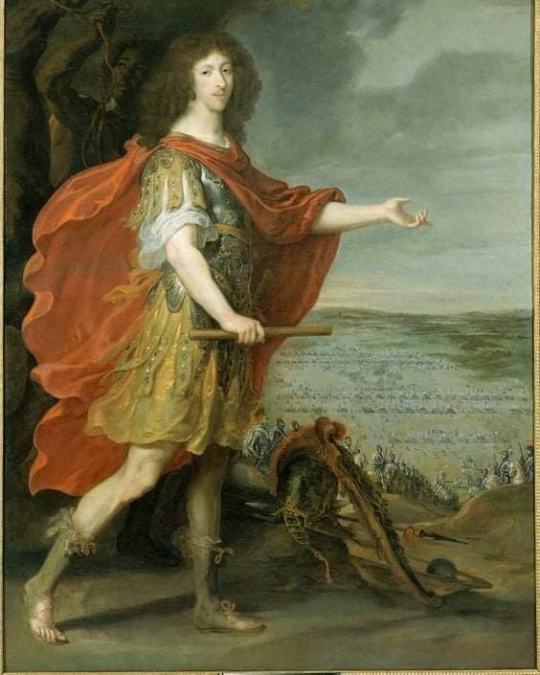
LES LUMIÈRES DE VERSAILLES « Un Prince [Condé] qui a honoré la Maison de France, tout le nom français, son siècle, et pour ainsi dire l’humanité tout entière. » BOSSUET (1627-1704), Oraison funèbre de Louis de Bourbon (1686) 1/ UNE IDÉE DE PEINTURE Louis II de bourbon (1621-1686), prince de condé, devant le champ de bataille de Rocroi de Justus van Egmont ,peintre flamand (1601-1674). Après un voyage en Italie, qu'il commença en 1618, il entra dans l'atelier de Rubens. En 1628, Justus van Egmont alla s'établir à Paris, où il devint peintre de Louis XIII, puis de Louis XIV. Très apprécié en France comme portraitiste, Justus Van Egmont participa également aux grandes décorations dirigées par Simon Vouet. 2/ UN PEU D'HISTOIRE MODERNE On oublie sa Fronde et son alliance avec l’Espagne ennemie, pour ne plus rappeler que le jeune vainqueur de Rocroi et de Nördlingen avec Turenne, puis ses campagnes de Franche-Comté et d’Alsace au service de Louis XIV. Le Grand Condé, à l’inverse de Turenne mort à 65 ans au combat, acheva au même âge sa vie à Chantilly, entouré de poètes et d’écrivains (Boileau, Racine). 3/ UNE MUSIQUE D'UN BONHEUR CONTAGIEUX Henry Madin (1698-1748) 'Te Deum', Grand Motet HM 28 https://youtu.be/LC88V1FLkFc Gentilhomme d'origine irlandaise, Henry Madin apprend la musique à Verdun dans l'Est de la France. À partir de 1741, protégé par Louis XV, Madin obtient une charge de Gouverneur des Pages à la Chapelle Royale du Château de Versailles. Madin est l’auteur de nombreuses œuvres de musique sacrée. Il est également l'auteur d'un ouvrage de théorie musicale, le Traité de contrepoint simple, ou Chant sur le Livre (Paris, 1742). Tout comme les compositeurs français de l'époque, il écrivit un Te Deum. #leslumièresdeversailles https://www.facebook.com/groups/716146568740323/?ref=share_group_link https://www.instagram.com/p/CWBGRYusGyQ/?utm_medium=tumblr
0 notes
Text
Lusitania U-Boat Captain Killed
September 5 1917, Terschelling--Walther Schwieger continued to command the U-20 after the sinking of the Lusitania. He even continued to do so after sinking another passenger liner, the Hesperian, despite strict orders not to do so (and widespread condemnation afterwards, even within the German Navy). The U-20 was grounded and scuttled on the Danish coast in late 1916, and Schwieger would not return to the submarine war until after American entry into the war, this time in the new submarine U-88.
On September 5, Schweiger ran across the British Q-ship HMS Stonecrop in the Heligoland Bight. The encounter did not proceed as planned for either vessel, and resulted in the Stonecrop giving chase. The chase abruptly ended when the U-88 ran into and detonated a British mine. The submarine sank almost instantly; all 43 on board, including Schwieger, were killed.
Schwieger’s reputation in Germany had been improving before his death (he was awarded a Pour le Mérite in July), and was cemented by it. His death was not publicized in Allied nations until August 1918. At that point, The New York Times, in full war fever as victory approached, editorialized:
There is a certain plausibility of poetic justice in his end, but if he had been human and not a German machine, he should have lived until he made away with himself; or, his mind broken with intolerable remembrances, he should have passed long years in a madhouse. But he was only a German. He only obeyed orders. To do the arch-deed of pitiless savagery was to win promotion. With what a delirium of rejoicing, shoehorn to what endless bumpers, was that exploit celebrated by the German tribes!
Today in 1916: Mackensen Attacks “Romanian Verdun,” Captures It In One Day
Today in 1915: British Prepare for Deployment of Poison Gas
Today in 1914: Battle of the Marne Begins
#wwi#ww1#ww1 history#ww1 centenary#world war 1#world war i#world war one#The First World War#the great war#Lusitania#september 1917#anti-submarine warfare#submarine warfare#unrestricted submarine warfare
45 notes
·
View notes
Text
For many, the mention of ‘cosmetic surgery’ conjures images of vanity. The never-ending and inevitably fruitless attempt to stave off the years. Add some here and take it off over there. But what of the face left smashed and misshapen, burned or blown half off in service to country?

“Plastic” Surgery, the term comes to us from the Greek Plastikos and first used by the 18th century French surgeon Pierre Desault, has been with us longer than you might expect. Evidence exists of Hindu surgeons performing primitive ‘nose jobs’, as early as BC800-600. The Renaissance-era surgeon Gaspare Tagliacozzi (1545-1599) developed new methods of reconstruction, using the patient’s own arm skin to replace noses slashed off in swordplay.
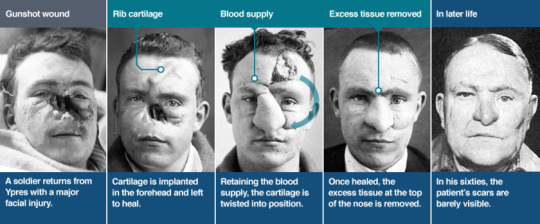
Lt. William M. Spreckley of the Sherwood Foresters was Dr. Gillies’ 132nd patient, admitted to the hospital in January 1917 at the age of 33 with a ‘GSW, Nose”. He was discharged 3½ years later.
A hillside battle at a place called Hastings changed the world in 1066 yet, if you were on the next hillside, you may not have heard a thing. The industrialized warfare of the 19th and 20th century was vastly different, involving entire populations and inflicting unprecedented levels of destruction on the human form.
It is beyond horrifying what modern warfare can do to the human form
It’s been said of the American civil war and is no doubt true of any number of conflicts, that a generation of women had to accustom themselves to new ideas of male ‘beauty’. The ‘Great War’ of 1914 – ‘18 was particularly egregious when it came to injuries to the face, neck and arms, as millions of soldiers burrowed into 450-mile-long trench lines to escape what German Private Ernst Jünger described as the “Storm of Steel”.
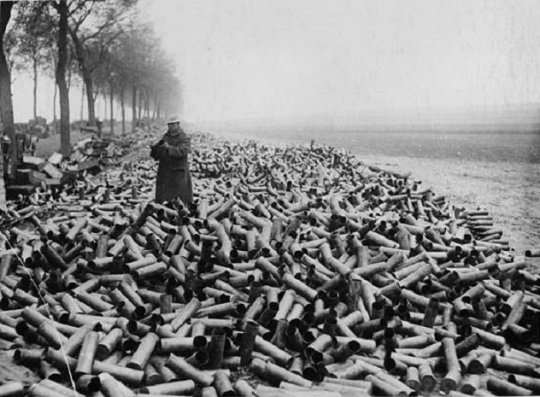
In the Battle of Verdun, German forces used 1,200 guns firing 2.5 million shells supplied by 1,300 ammunition trains to attack their Allied adversary on the First Day, alone.
For every soldier killed in the Great War, two returned home, maimed. Artillery was especially malevolent, with “drumfire” so rapid as to resemble the rat-a-tat-tat of drums, each blast sending thousands of jagged pieces of metal, shrieking through the air.
For many, severe facial disfigurement was a fate worse than amputation. Worse than death, even. To have been grievously wounded in service to country and return home to be treated not as a wounded warrior, but as something hideous.
The untold human misery of having been turned into a monster, misshapen and ugly. For these men, life often became one of ostracism and loneliness. The painful stares of friends and strangers alike, repelled by such disfiguration, offtimes lead to alcoholism, divorce and suicide.
Manchester Massachusetts sculptor Anna Coleman Ladd moved to France in 1917. Inspired by the work of British artist Francis Derwent Wood and his “tin noses shop”, Ladd founded the “Studio for Portrait-Masks” of the Red Cross in Toul, to provide cosmetic prosthetics for men disfigured by the war.
Ladd’s prostheses were uncomfortable to wear, but her services earned her the Légion d’Honneur Croix de Chevalier and the Serbian Order of Saint Sava.
The New Zealand-born otolaryngologist Dr. Harold Gillies was shocked at the human destruction, while working with the French-American dental surgeon Sir August Charles Valadier on new techniques of jaw reconstruction and other maxillofacial procedures.
The interior of the Plastic Theatre at the Queen’s Hospital. Dr Gillie is seated, on the right
The sterile medical notation “GSW (gunshot wound) Face” does not begin to prepare the mind for a horror more closely resembling a highway roadkill, than the face of a living man. I left the worst of such images out of this essay. They’re easy enough to find on-line, if you’re interested in seeing them. The medical science is fascinating, but the images are hard to look at.
Dr. Gillies watched the renowned French surgeon Hippolyte Morestin, a man known as “The Father of the Mouths” after multiple breakthroughs in oral surgery, remove a tumor and use the patient’s own jaw-skin, to repair the damage.
Joseph Pickard, of the 5th Northumberland Fusiliers, before and after Dr. Gillies. H/T Daily Mail
Gillies understood the importance of the work, and spoke with British Chief Surgeon Sir William Arbuthnot Lane. The conversation lead to a 1,000-bed facial trauma ward at Queen Mary’s Hospital in Sidcup, Kent, opened in June, 1917.
The largest naval battle of the Great War, the Battle of Jutland, unfolded between May 31 and June 1, 1916, involving 250 ships and some 100,000 men.
The Queen Elizabeth-class battleship HMS Warspite took fifteen direct hits from German heavy shells, at one point having no rudder control and helplessly turning in circles.
Petty Office Walter Yeo
Petty Officer Walter Yeo was manning the guns aboard Warspite and received terrible injuries to his face, including the loss of upper and lower eylids, and extensive blast and burn damage to his nose, cheeks and forehead.
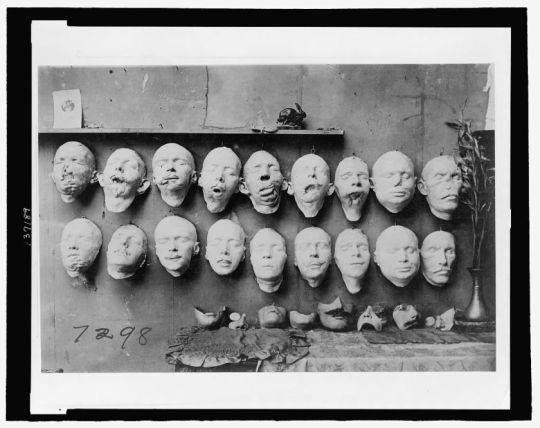
When all else failed, there were the facial prosthetics. The masks.
Yeo was admitted to Queen Mary’s hospital the following August, where he was treated by Dr. Gillies and believed to be the first recipient of a full facial graft taken from another part of his own body.
Dr. Gillies & Co. developed surgical methods in which rib cartilage is first implanted in foreheads, and then swung down to form the foundational structure of a new nose.
At a time before antibiotics, tissue grafts could be as dangerous as the trenches themselves. “Tubed pedicles” were developed to get around the problem of infection, where living tissue and its blood supply was rolled into tubes and protected by the natural layer of skin. These tubes of living tissue weren’t pretty to look but were relatively safe from infection. When the patient was ready, new tissue could be “walked” into place, become whole new facial features.
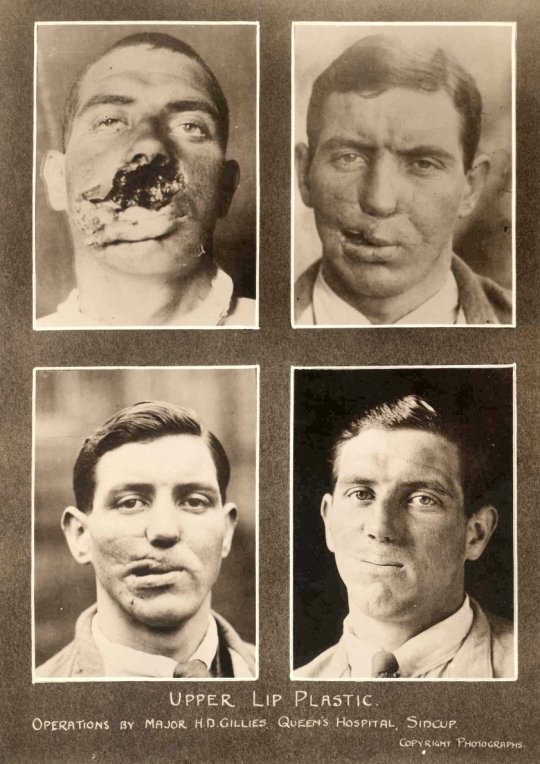
Dr. Harold Gelf Gillies, the Father of modern plastic surgery, performed more than 11,000 such procedures with his colleagues, on over 5,000 individuals. Work continued well after the war and through the mid-twenties, developing new and important surgical techniques.
Dr. Gillies received a knighthood for his work in 1930 and, during the inter-war years, trained many other Commonwealth physicians on his surgical methods. Just in time, for the destruction of the following generation.
If you enjoyed this “Today in History”, please feel free to re-blog, “like” & share on social media, so that others may find and enjoy it as well. Please click the “follow” button on the right, to receive email updates on new articles. Thank you for your interest, in the history we all share.
May 31, 1916 The Man who Fixed Faces For many, the mention of ‘cosmetic surgery’ conjures images of vanity. The never-ending and inevitably fruitless attempt to stave off the years.
0 notes
Text
Events 12.18
1271 – Kublai Khan renames his empire "Yuan" (元 yuán), officially marking the start of the Yuan dynasty of Mongolia and China.
1499 – A rebellion breaks out in Alpujarras in response to the forced conversions of Muslims in Spain.
1622 – Portuguese forces score a military victory over the Kingdom of Kongo at the Battle of Mbumbi in present-day Angola.
1655 – The Whitehall Conference ends with the determination that there was no law preventing Jews from re-entering England after the Edict of Expulsion of 1290.
1777 – The United States celebrates its first Thanksgiving, marking the recent victory by the American rebels over British General John Burgoyne at Saratoga in October.
1787 – New Jersey becomes the third state to ratify the U.S. Constitution.
1793 – Surrender of the frigate La Lutine by French Royalists to Lord Samuel Hood; renamed HMS Lutine, she later becomes a famous treasure wreck.
1833 – The national anthem of the Russian Empire, "God Save the Tsar!", is first performed.
1854 – The Legislative Assembly of the Province of Canada abolishes the seigneurial system.
1865 – US Secretary of State William Seward proclaims the adoption of the Thirteenth Amendment, prohibiting slavery throughout the United States.
1867 – A magnitude 7.0 earthquakes strikes off the coast of Taiwan, triggering a tsunami and killing at least 580 people.
1878 – The Al-Thani family become the rulers of the state of Qatar.
1892 – Premiere performance of The Nutcracker by Pyotr Ilyich Tchaikovsky in Saint Petersburg, Russia.
1898 – Gaston de Chasseloup-Laubat sets the first officially recognized land speed record of 63.159 km/h (39.245 mph) in a Jeantaud electric car.
1916 – World War I: The Battle of Verdun ends when the second French offensive pushes the Germans back two or three kilometres, causing them to cease their attacks.
1917 – The resolution containing the language of the Eighteenth Amendment to enact Prohibition is passed by the United States Congress.
1932 – The Chicago Bears defeat the Portsmouth Spartans in the first NFL playoff game to win the NFL Championship.
1935 – The Lanka Sama Samaja Party is founded in Ceylon.
1939 – World War II: The Battle of the Heligoland Bight, the first major air battle of the war, takes place.
1944 – World War II: XX Bomber Command responds to the Japanese Operation Ichi-Go offensive by dropping five hundred tons of incendiary bombs on a supply base in Hankow, China.
1958 – Project SCORE, the world's first communications satellite, is launched.
1966 – Saturn's moon Epimetheus is discovered by astronomer Richard Walker.
1972 – Vietnam War: President Richard Nixon announces that the United States will engage North Vietnam in Operation Linebacker II, a series of Christmas bombings, after peace talks collapsed with North Vietnam on the 13th.
1973 – Soviet Soyuz Programme: Soyuz 13, crewed by cosmonauts Valentin Lebedev and Pyotr Klimuk, is launched from Baikonur in the Soviet Union.
1977 – United Airlines Flight 2860 crashes near Kaysville, Utah, killing all three crew members on board.
1977 – SA de Transport Aérien Flight 730 crashes near Madeira Airport in Funchal, Madeira, Portugal, killing 36.
1981 – First flight of the Russian heavy strategic bomber Tu-160, the world's largest combat aircraft, largest supersonic aircraft and largest variable-sweep wing aircraft built.
1995 – A Lockheed L-188 Electra crashes in Jamba, Cuando Cubango, Angola, killing 141 people.
1999 – NASA launches into orbit the Terra platform carrying five Earth Observation instruments, including ASTER, CERES, MISR, MODIS and MOPITT.
2002 – California gubernatorial recall: Then Governor of California Gray Davis announces that the state would face a record budget deficit of $35 billion, roughly double the figure reported during his reelection campaign one month earlier.
2005 – The Chadian Civil War begins when rebel groups, allegedly backed by neighbouring Sudan, launch an attack in Adré.
2006 – The first of a series of floods strikes Malaysia. The death toll of all flooding is at least 118, with over 400,000 people displaced.
2006 – United Arab Emirates holds its first-ever elections.
2015 – Kellingley Colliery, the last deep coal mine in Great Britain, closes.
2017 – Amtrak Cascades passenger train 501, derailed near DuPont, Washington, a city in United States near Olympia, Washington killing six people, and injuring 70 others.
2018 – List of bolides: A meteor exploded over the Bering Sea with a force over 10 times greater than the atomic bomb that destroyed Hiroshima in 1945.
2019 – The United States House of Representatives impeaches Donald Trump for the first time.
0 notes
Photo
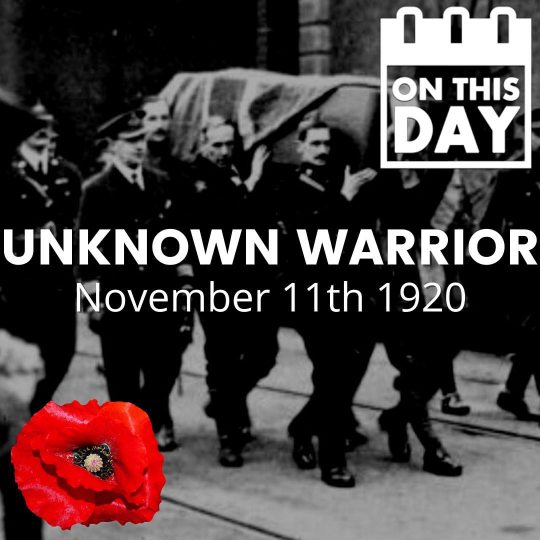
Two years after the end of WW1 in 1920, a military operation took place on the Western Front. A team of men exhumed the remains of several British soldiers from various make shift battlefield graves. The following morning one of the bodies was selected at random and the others were reinterred. The coffin was then loaded onto HMS Verdun bound for Dover and received in England by a Field Marshall’s 19-gun salute. It was then transported by train to London and on the morning of November 11th it was taken by gun carriage through vast silent crowds to Westminster Abbey. The Unknown Warrior was laid to rest in soil taken from the battlefields of France were it remains to this day. 100 invited women who had lost their husbands and their sons in battle attended the service. The relatives and descendants of half a million soldiers whose bodies were never identified could believe that the Unknown Warrior could be their relative. Three days after Jesus was crucified his family and friends visited the tomb where his body had been placed but the body was missing and in its places was an angel who said “Why do you look for the living among the dead? Jesus is not here, he has risen from the dead.” Although we don’t know who the soldier is inside the tomb in Westminster Abbey we do know that a soldier’s remains are there but the tomb of Jesus is empty. His body has never been found because he is alive. The Gospel of Christ is the life-changing message of an empty tomb. These are the words of Jesus himself “I am the resurrection and the life. The ones who believe in me will live, even though they die.” It can be true for you today. The Bible says this about God “When you come looking for me, you’ll find me."
0 notes
Text
Events 12.18
1271 – Kublai Khan renames his empire "Yuan" (元 yuán), officially marking the start of the Yuan dynasty of Mongolia and China.
1499 – A rebellion breaks out in Alpujarras in response to the forced conversions of Muslims in Spain.
1622 – Portuguese forces score a military victory over the Kingdom of Kongo at the Battle of Mbumbi in present-day Angola.
1655 – The Whitehall Conference ends with the determination that there was no law preventing Jews from re-entering England after the Edict of Expulsion of 1290.[2]
1777 – The United States celebrates its first Thanksgiving, marking the recent victory by the American rebels over British General John Burgoyne at Saratoga in October.
1787 – New Jersey becomes the third state to ratify the U.S. Constitution.
1793 – Surrender of the frigate La Lutine by French Royalists to Lord Samuel Hood; renamed HMS Lutine, she later becomes a famous treasure wreck.
1833 – The national anthem of the Russian Empire, "God Save the Tsar!", is first performed.
1854 – The Legislative Assembly of the Province of Canada abolishes the seigneurial system.
1865 – US Secretary of State William Seward proclaims the adoption of the Thirteenth Amendment, prohibiting slavery throughout the USA.
1878 – The Al-Thani family become the rulers of the state of Qatar.
1892 – Premiere performance of The Nutcracker by Pyotr Ilyich Tchaikovsky in Saint Petersburg, Russia.
1898 – Gaston de Chasseloup-Laubat sets the first officially recognized land speed record of 63.159 km/h (39.245 mph) in a Jeantaud electric car.
1916 – World War I: The Battle of Verdun ends when the second French offensive pushes the Germans back two or three kilometres, causing them to cease their attacks.
1917 – The resolution containing the language of the Eighteenth Amendment to enact Prohibition is passed by the United States Congress.
1932 – The Chicago Bears defeat the Portsmouth Spartans in the first NFL playoff game to win the NFL Championship.
1935 – The Lanka Sama Samaja Party is founded in Ceylon.
1939 – World War II: The Battle of the Heligoland Bight, the first major air battle of the war, takes place.
1944 – World War II: XX Bomber Command responds to the Japanese Operation Ichi-Go offensive by dropping five hundred tons of incendiary bombs on a supply base in Hankow, China.
1958 – Project SCORE, the world's first communications satellite, is launched.
1966 – Saturn's moon Epimetheus is discovered by astronomer Richard Walker.
1972 – Vietnam War: President Richard Nixon announces that the United States will engage North Vietnam in Operation Linebacker II, a series of Christmas bombings, after peace talks collapsed with North Vietnam on the 13th.
1973 – Soviet Soyuz Programme: Soyuz 13, crewed by cosmonauts Valentin Lebedev and Pyotr Klimuk, is launched from Baikonur in the Soviet Union.
1977 – United Airlines Flight 2860 crashes near Kaysville, Utah, killing all three crew members on board.
1977 – SA de Transport Aérien Flight 730 crashes near Madeira Airport in Funchal, Madeira, Portugal, killing 36.
1981 – First flight of the Russian heavy strategic bomber Tu-160, the world's largest combat aircraft, largest supersonic aircraft and largest variable-sweep wing aircraft built.
1995 – A Lockheed L-188 Electra crashes in Jamba, Cuando Cubango, Angola, killing 141.
1999 – NASA launches into orbit the Terra platform carrying five Earth Observation instruments, including ASTER, CERES, MISR, MODIS and MOPITT.
2002 – California gubernatorial recall: Then Governor of California Gray Davis announces that the state would face a record budget deficit of $35 billion, roughly double the figure reported during his reelection campaign one month earlier.
2005 – The Chadian Civil War begins when rebel groups, allegedly backed by neighbouring Sudan, launch an attack in Adré.
2006 – The first of a series of floods strikes Malaysia. The death toll of all flooding is at least 118, with over 400,000 people displaced.
2006 – United Arab Emirates holds its first-ever elections.
2015 – Kellingley Colliery, the last deep coal mine in Great Britain, closes.
2017 – Amtrak Cascades passenger train 501, derailed near DuPont, Washington, a city in United States near Olympia, Washington killing six people, and injuring 70 others.
2018 – List of bolides: A meteor exploded over the Bering Sea with a force over 10 times greater than the atomic bomb that destroyed Hiroshima in 1945.
2019 – The United States House of Representatives impeaches Donald Trump for the first time.
0 notes
Text
Events 12.18
218 BC – Second Punic War: Battle of the Trebia: Hannibal's Carthaginian forces defeat those of the Roman Republic.
1271 – Kublai Khan renames his empire "Yuan" (元 yuán), officially marking the start of the Yuan dynasty of Mongolia and China.
1499 – A rebellion breaks out in Alpujarras in response to the forced conversions of Muslims in Spain.
1622 – Portuguese forces score a military victory over the Kingdom of Kongo at the Battle of Mbumbi in present-day Angola.
1655 – The Whitehall Conference ends with the determination that there was no law preventing Jews from re-entering England after the Edict of Expulsion of 1290.
1777 – The United States celebrates its first Thanksgiving, marking the recent victory by the American rebels over British General John Burgoyne at Saratoga in October.
1787 – New Jersey becomes the third state to ratify the U.S. Constitution.
1793 – Surrender of the frigate La Lutine by French Royalists to Lord Samuel Hood; renamed HMS Lutine, she later becomes a famous treasure wreck.
1833 – The national anthem of the Russian Empire, "God Save the Tsar!", is first performed.
1854 – The Legislative Assembly of the Province of Canada abolishes the seigneurial system.
1865 – US Secretary of State William Seward proclaims the adoption of the Thirteenth Amendment, prohibiting slavery throughout the USA.
1878 – The Al-Thani family become the rulers of the state of Qatar.
1892 – Premiere performance of The Nutcracker by Pyotr Ilyich Tchaikovsky in Saint Petersburg, Russia.
1898 – Gaston de Chasseloup-Laubat sets the first officially recognized land speed record of 39.245 mph (63.159 km/h) in a Jeantaud electric car.
1900 – The Upper Ferntree Gully to Gembrook, Victoria Narrow-gauge (2 ft 6 in or 762 mm) Railway (now the Puffing Billy Railway) in Victoria, Australia is opened for traffic.
1916 – World War I: The Battle of Verdun ends when the second French offensive pushes the Germans back two or three kilometres, causing them to cease their attacks.
1917 – The resolution containing the language of the Eighteenth Amendment to enact Prohibition is passed by the United States Congress.
1932 – The Chicago Bears defeat the Portsmouth Spartans in the first NFL playoff game to win the NFL Championship.
1935 – The Lanka Sama Samaja Party is founded in Ceylon.
1939 – World War II: The Battle of the Heligoland Bight, the first major air battle of the war, takes place.
1944 – World War II: XX Bomber Command responds to the Japanese Operation Ichi-Go offensive by dropping five hundred tons of incendiary bombs on a supply base in Hankow, China.
1958 – Project SCORE, the world's first communications satellite, is launched.
1966 – Saturn's moon Epimetheus is discovered by astronomer Richard Walker.
1972 – Vietnam War: President Richard Nixon announces that the United States will engage North Vietnam in Operation Linebacker II, a series of Christmas bombings, after peace talks collapsed with North Vietnam on the 13th.
1973 – Soviet Soyuz Programme: Soyuz 13, crewed by cosmonauts Valentin Lebedev and Pyotr Klimuk, is launched from Baikonur in the Soviet Union.
1977 – United Airlines Flight 2860 crashes near Kaysville, Utah, killing all three crew members on board.
1981 – First flight of the Russian heavy strategic bomber Tu-160, the world's largest combat aircraft, largest supersonic aircraft and largest variable-sweep wing aircraft built.
1999 – NASA launches into orbit the Terra platform carrying five Earth Observation instruments, including ASTER, CERES, MISR, MODIS and MOPITT.
2002 – California gubernatorial recall: Then Governor of California Gray Davis announces that the state would face a record budget deficit of $35 billion, roughly double the figure reported during his reelection campaign one month earlier.
2005 – The Chadian Civil War begins when rebel groups, allegedly backed by neighbouring Sudan, launch an attack in Adré.
2006 – The first of a series of floods strikes Malaysia. The death toll of all flooding is at least 118, with over 400,000 people displaced.
2006 – United Arab Emirates holds its first-ever elections.
2015 – Kellingley Colliery, the last deep coal mine in Great Britain, closes.
2017 – Amtrak Cascades passenger train 501, derailed near DuPont, Washington, a city in United States near Olympia, Washington killing six people, and injuring 70 others.
2018 – List of bolides: A meteor exploded over the Bering Sea with a force over 10 times greater than the atomic bomb that destroyed Hiroshima in 1945.
2019 – The United States House of Representatives votes in support of the impeachment of Donald Trump.
0 notes
Text
Events 4.9
190 – Dong Zhuo has his troops evacuate the capital Luoyang and burn it to the ground.
475 – Byzantine Emperor Basiliscus issues a circular letter (Enkyklikon) to the bishops of his empire, supporting the Monophysite christological position.
537 – Siege of Rome: The Byzantine general Belisarius receives his promised reinforcements, 1,600 cavalry, mostly of Hunnic or Slavic origin and expert bowmen. He starts, despite shortages, raids against the Gothic camps and Vitiges is forced into a stalemate.
1241 – Battle of Liegnitz: Mongol forces defeat the Polish and German armies.
1288 – Mongol invasions of Vietnam: Yuan forces are defeated by Trần forces in the Battle of Bach Dang in present-day northern Vietnam.
1388 – Despite being outnumbered 16 to 1, forces of the Old Swiss Confederacy are victorious over the Archduchy of Austria in the Battle of Näfels.
1413 – Henry V is crowned King of England.
1440 – Christopher of Bavaria is appointed King of Denmark.
1454 – The Treaty of Lodi is signed, establishing a balance of power among northern Italian city-states for almost 50 years.
1511 – St John's College, Cambridge, England, founded by Lady Margaret Beaufort, receives its charter.
1585 – The expedition organised by Sir Walter Raleigh departs England for Roanoke Island (now in North Carolina) to establish the Roanoke Colony.
1609 – Eighty Years' War: Spain and the Dutch Republic sign the Treaty of Antwerp to initiate twelve years of truce.
1609 – Philip III of Spain issues the decree of the "Expulsion of the Moriscos".
1682 – Robert Cavelier de La Salle discovers the mouth of the Mississippi River, claims it for France and names it Louisiana.
1782 – American Revolutionary War: Battle of the Saintes begins.
1784 – The Treaty of Paris, ratified by the United States Congress on January 14, 1784, is ratified by King George III of the Kingdom of Great Britain, ending the American Revolutionary War. Copies of the ratified documents are exchanged on May 12, 1784.
1860 – On his phonautograph machine, Édouard-Léon Scott de Martinville makes the oldest known recording of an audible human voice.
1865 – American Civil War: Robert E. Lee surrenders the Army of Northern Virginia (26,765 troops) to Ulysses S. Grant at Appomattox Court House, Virginia, effectively ending the war.
1909 – The U.S. Congress passes the Payne–Aldrich Tariff Act.
1914 – Mexican Revolution: One of the world's first naval/air skirmishes takes place off the coast of western Mexico.
1916 – World War I: The Battle of Verdun: German forces launch their third offensive of the battle.
1917 – World War I: The Battle of Arras: The battle begins with Canadian Corps executing a massive assault on Vimy Ridge.
1918 – World War I: The Battle of the Lys: The Portuguese Expeditionary Corps is crushed by the German forces during what is called the Spring Offensive on the Belgian region of Flanders.
1937 – The Kamikaze arrives at Croydon Airport in London. It is the first Japanese-built aircraft to fly to Europe.
1939 – African-American singer Marian Anderson gives a concert at the Lincoln Memorial after being denied the use of Constitution Hall by the Daughters of the American Revolution.
1940 – World War II: Operation Weserübung: Germany invades Denmark and Norway.
1940 – Vidkun Quisling seizes power in Norway.
1942 – World War II: The Battle of Bataan ends. An Indian Ocean raid by Japan's 1st Air Fleet sinks the British aircraft carrier HMS Hermes and the Australian destroyer HMAS Vampire.
1945 – Execution of Dietrich Bonhoeffer, anti-Nazi dissident and spy, by the Nazi regime.
1945 – World War II: The German heavy cruiser Admiral Scheer is sunk by the Royal Air Force.
1945 – World War II: The Battle of Königsberg, in East Prussia, ends.
1945 – The United States Atomic Energy Commission is formed.
1947 – The Glazier–Higgins–Woodward tornadoes kill 181 and injure 970 in Texas, Oklahoma, and Kansas.
1947 – The Journey of Reconciliation, the first interracial Freedom Ride begins through the upper South in violation of Jim Crow laws. The riders wanted enforcement of the United States Supreme Court's 1946 Irene Morgan decision that banned racial segregation in interstate travel.
1947 – United Nations Security Council Resolution 22 relating to Corfu Channel incident is adopted.
1948 – Jorge Eliécer Gaitán's assassination provokes a violent riot in Bogotá (the Bogotazo), and a further ten years of violence in Colombia.
1948 – Fighters from the Irgun and Lehi Zionist paramilitary groups attacked Deir Yassin near Jerusalem, killing over 100.
1952 – Hugo Ballivián's government is overthrown by the Bolivian National Revolution, starting a period of agrarian reform, universal suffrage and the nationalization of tin mines
1957 – The Suez Canal in Egypt is cleared and opens to shipping following the Suez Crisis.
1959 – Project Mercury: NASA announces the selection of the United States' first seven astronauts, whom the news media quickly dub the "Mercury Seven".
1960 – Dr Hendrik Verwoerd, Prime Minister of South Africa and architect of apartheid, narrowly survives an assassination attempt by a white farmer, David Pratt in Johannesburg.
1961 – The Pacific Electric Railway in Los Angeles, once the largest electric railway in the world, ends operations.
1965 – Astrodome opens. First indoor baseball game is played.
1967 – The first Boeing 737 (a 100 series) makes its maiden flight.
1969 – The first British-built Concorde 002 makes its maiden flight from Filton to RAF Fairford.
1975 – The first game of the Philippine Basketball Association, the second oldest professional basketball league in the world.
1976 – The EMD F40PH diesel locomotive enters revenue service with Amtrak.
1980 – The Iraqi regime of Saddam Hussein kills philosopher Muhammad Baqir al-Sadr and his sister Bint al-Huda after three days of torture.
1981 – The U.S. Navy nuclear submarine USS George Washington accidentally collides with the Nissho Maru, a Japanese cargo ship, sinking it.
1989 – Tbilisi massacre: an anti-Soviet peaceful demonstration and hunger strike in Tbilisi, demanding restoration of Georgian independence, is dispersed by the Soviet Army, resulting in 20 deaths and hundreds of injuries.
1990 – An IRA bombing in County Down, Northern Ireland, kills three members of the UDR.
1990 – Thirteen thousand members of the Dene and Métis tribes sign a land claim agreement for 180,000 square kilometres (69,000 sq mi) in the Mackenzie Valley of the western Arctic.
1991 – Georgia declares independence from the Soviet Union.
1992 – A U.S. Federal Court finds former Panamanian dictator Manuel Noriega guilty of drug and racketeering charges. He is sentenced to 30 years in prison.
1999 – Kosovo War: The Battle of Košare begins.
2003 – Iraq War: Baghdad falls to American forces.
2005 – Charles, Prince of Wales marries Camilla Parker Bowles in a civil ceremony at Windsor's Guildhall.
2009 – In Tbilisi, Georgia, up to 60,000 people protest against the government of Mikheil Saakashvili.
2013 – A 6.1–magnitude earthquake strikes Iran killing 32 people and injuring over 850 people.
2013 – At least 13 people are killed and another three injured after a man goes on a spree shooting in the Serbian village of Velika Ivanča.
2014 – A student stabs 20 people at Franklin Regional High School in Murrysville, Pennsylvania.
2017 – Palm Sunday church bombings at Coptic Churches in Tanta and Alexandria, Egypt, take place.
2017 – After refusing to give up his seat on an overbooked United Airlines flight, Dr. David Dao Duy Anh is forcibly dragged off the flight by aviation security officers, leading to major criticism of United Airlines.
0 notes
Text
Events 12.18
218 BC – Second Punic War: Battle of the Trebia: Hannibal's Carthaginian forces defeat those of the Roman Republic.
1271 – Kublai Khan renames his empire "Yuan" (元 yuán), officially marking the start of the Yuan dynasty of Mongolia and China.
1499 – A rebellion breaks out in Alpujarras in response to the forced conversions of Muslims in Spain.
1622 – Portuguese forces score a military victory over the Kingdom of Kongo at the Battle of Mbumbi in present-day Angola.
1655 – The Whitehall Conference ends with the determination that there was no law preventing Jews from re-entering England after the Edict of Expulsion of 1290.
1777 – The United States celebrates its first Thanksgiving, marking the recent victory by the American rebels over British General John Burgoyne at Saratoga in October.
1787 – New Jersey becomes the third state to ratify the U.S. Constitution.
1793 – Surrender of the frigate La Lutine by French Royalists to Lord Samuel Hood; renamed HMS Lutine, she later becomes a famous treasure wreck.
1833 – The national anthem of the Russian Empire, "God Save the Tsar!", is first performed.
1854 – The Legislative Assembly of the Province of Canada abolishes the seigneurial system.
1865 – US Secretary of State William Seward proclaims the adoption of the Thirteenth Amendment, prohibiting slavery throughout the USA.
1878 – The Al-Thani family become the rulers of the state of Qatar.
1892 – Premiere performance of The Nutcracker by Pyotr Ilyich Tchaikovsky in Saint Petersburg, Russia.
1898 – Gaston de Chasseloup-Laubat sets the first officially recognized land speed record of 39.245 mph (63.159 km/h) in a Jeantaud electric car.
1900 – The Upper Ferntree Gully to Gembrook, Victoria Narrow-gauge (2 ft 6 in or 762 mm) Railway (now the Puffing Billy Railway) in Victoria, Australia is opened for traffic.
1916 – World War I: The Battle of Verdun ends when German forces under Chief of staff Erich von Falkenhayn are defeated by the French, and suffer 337,000 casualties.
1917 – The resolution containing the language of the Eighteenth Amendment to enact Prohibition is passed by the United States Congress.
1932 – The Chicago Bears defeat the Portsmouth Spartans in the first NFL playoff game to win the NFL Championship.
1935 – The Lanka Sama Samaja Party is founded in Ceylon.
1939 – World War II: The Battle of the Heligoland Bight, the first major air battle of the war, takes place.
1944 – World War II: Seventy-seven B-29 Superfortress and 200 other aircraft of U.S. Fourteenth Air Force bomb Hankow, China, a Japanese supply base.
1958 – Project SCORE, the world's first communications satellite, is launched.
1966 – Saturn's moon Epimetheus is discovered by astronomer Richard Walker.
1972 – Vietnam War: President Richard Nixon announces that the United States will engage North Vietnam in Operation Linebacker II, a series of Christmas bombings, after peace talks collapsed with North Vietnam on the 13th.
1973 – Soviet Soyuz Programme: Soyuz 13, crewed by cosmonauts Valentin Lebedev and Pyotr Klimuk, is launched from Baikonur in the Soviet Union.
1977 – United Airlines Flight 2860 crashes near Kaysville, Utah, killing all three crew members on board.
1981 – First flight of the Russian heavy strategic bomber Tu-160, the world's largest combat aircraft, largest supersonic aircraft and largest variable-sweep wing aircraft built.
1999 – NASA launches into orbit the Terra platform carrying five Earth Observation instruments, including ASTER, CERES, MISR, MODIS and MOPITT.
2002 – California gubernatorial recall: Then Governor of California Gray Davis announces that the state would face a record budget deficit of $35 billion, roughly double the figure reported during his reelection campaign one month earlier.
2005 – The Chadian Civil War begins when rebel groups, allegedly backed by neighbouring Sudan, launch an attack in Adré.
2006 – The first of a series of floods strikes Malaysia. The death toll of all flooding is at least 118, with over 400,000 people displaced.
2006 – United Arab Emirates holds its first-ever elections.
2015 – Kellingley Colliery, the last deep coal mine in Great Britain, closes.
2017 – Amtrak Cascades passenger train 501, derailed near DuPont, Washington, a city in United States near Olympia, Washington killing six people, and injuring 70 others.
2018 – List of bolides: A meteor exploded over the Bering Sea with a force over 10 times greater than the atomic bomb that destroyed Hiroshima in 1945.
0 notes
Text
Events 4.9
190 – Dong Zhuo has his troops evacuate the capital Luoyang and burn it to the ground.
475 – Byzantine Emperor Basiliscus issues a circular letter (Enkyklikon) to the bishops of his empire, supporting the Monophysite christological position.
537 – Siege of Rome: The Byzantine general Belisarius receives his promised reinforcements, 1,600 cavalry, mostly of Hunnic or Slavic origin and expert bowmen. He starts, despite shortages, raids against the Gothic camps and Vitiges is forced into a stalemate.
1241 – Battle of Liegnitz: Mongol forces defeat the Polish and German armies.
1288 – Mongol invasions of Vietnam: Yuan forces are defeated by Trần forces in the Battle of Bach Dang in present-day northern Vietnam.
1388 – Despite being outnumbered 16 to 1, forces of the Old Swiss Confederacy are victorious over the Archduchy of Austria in the Battle of Näfels.
1413 – Henry V is crowned King of England.
1440 – Christopher of Bavaria is appointed King of Denmark.
1454 – The Treaty of Lodi is signed, establishing a balance of power among northern Italian city-states for almost 50 years.
1511 – St John's College, Cambridge, England, founded by Lady Margaret Beaufort, receives its charter.
1585 – The expedition organised by Sir Walter Raleigh departs England for Roanoke Island (now in North Carolina) to establish the Roanoke Colony.
1609 – Eighty Years' War: Spain and the Dutch Republic sign the Treaty of Antwerp to initiate twelve years of truce.
1609 – Philip III of Spain issues the decree of the "Expulsion of the Moriscos".
1682 – Robert Cavelier de La Salle discovers the mouth of the Mississippi River, claims it for France and names it Louisiana.
1782 – American Revolutionary War: Battle of the Saintes begins.
1860 – On his phonautograph machine, Édouard-Léon Scott de Martinville makes the oldest known recording of an audible human voice.
1865 – American Civil War: Robert E. Lee surrenders the Army of Northern Virginia (26,765 troops) to Ulysses S. Grant at Appomattox Court House, Virginia, effectively ending the war.
1909 – The U.S. Congress passes the Payne–Aldrich Tariff Act.
1914 – Mexican Revolution: One of the world's first naval/air skirmishes takes place off the coast of western Mexico.
1916 – World War I: The Battle of Verdun: German forces launch their third offensive of the battle.
1917 – World War I: The Battle of Arras: The battle begins with Canadian Corps executing a massive assault on Vimy Ridge.
1918 – World War I: The Battle of the Lys: The Portuguese Expeditionary Corps is crushed by the German forces during what is called the Spring Offensive on the Belgian region of Flanders.
1937 – The Kamikaze arrives at Croydon Airport in London. It is the first Japanese-built aircraft to fly to Europe.
1939 – Marian Anderson gave a concert at the Lincoln Memorial after being denied the use of Constitution Hall by the Daughters of the American Revolution.
1940 – World War II: Operation Weserübung: Germany invades Denmark and Norway.
1940 – Vidkun Quisling seizes power in Norway.
1942 – World War II: The Battle of Bataan ends. An Indian Ocean raid by Japan's 1st Air Fleet sinks the British aircraft carrier HMS Hermes and the Australian destroyer HMAS Vampire.
1945 – Execution of Dietrich Bonhoeffer, anti-Nazi dissident and spy, by the Nazi regime.
1945 – World War II: The German pocket battleship Admiral Scheer is sunk by the Royal Air Force
1945 – World War II: The Battle of Königsberg, in East Prussia, ends.
1945 – The United States Atomic Energy Commission is formed.
1947 – The Glazier–Higgins–Woodward tornadoes kill 181 and injure 970 in Texas, Oklahoma, and Kansas.
1947 – The Journey of Reconciliation, the first interracial Freedom Ride begins through the upper South in violation of Jim Crow laws. The riders wanted enforcement of the United States Supreme Court's 1946 Irene Morgan decision that banned racial segregation in interstate travel.
1947 – United Nations Security Council Resolution 22 relating to Corfu Channel incident is adopted.
1948 – Jorge Eliécer Gaitán's assassination provokes a violent riot in Bogotá (the Bogotazo), and a further ten years of violence in Colombia.
1948 – Fighters from the Irgun and Lehi Zionist paramilitary groups attacked Deir Yassin near Jerusalem, killing over 100.
1952 – Hugo Ballivián's government is overthrown by the Bolivian National Revolution, starting a period of agrarian reform, universal suffrage and the nationalization of tin mines
1957 – The Suez Canal in Egypt is cleared and opens to shipping following the Suez Crisis.
1959 – Project Mercury: NASA announces the selection of the United States' first seven astronauts, whom the news media quickly dub the "Mercury Seven".
1960 – Dr Hendrik Verwoerd, Prime Minister of South Africa and architect of apartheid, narrowly survives an assassination attempt by a white farmer, David Pratt in Johannesburg.
1961 – The Pacific Electric Railway in Los Angeles, once the largest electric railway in the world, ends operations.
1965 – Astrodome opens. First indoor baseball game is played.
1967 – The first Boeing 737 (a 100 series) makes its maiden flight.
1969 – The first British-built Concorde 002 makes its maiden flight from Filton to RAF Fairford.
1975 – The first game of the Philippine Basketball Association, the second oldest professional basketball league in the world.
1976 – The EMD F40PH diesel locomotive enters revenue service with Amtrak.
1980 – The Iraqi regime of Saddam Hussein kills philosopher Muhammad Baqir al-Sadr and his sister Bint al-Huda after three days of torture.
1981 – The U.S. Navy nuclear submarine USS George Washington accidentally collides with the Nissho Maru, a Japanese cargo ship, sinking it.
1989 – Tbilisi massacre: an anti-Soviet peaceful demonstration and hunger strike in Tbilisi, demanding restoration of Georgian independence, is dispersed by the Soviet Army, resulting in 20 deaths and hundreds of injuries.
1990 – An IRA bombing in County Down, Northern Ireland, kills three members of the UDR.
1990 – Thirteen thousand members of the Dene and Métis tribes sign a land claim agreement for 180,000 square kilometres (69,000 sq mi) in the Mackenzie Valley of the western Arctic.
1991 – Georgia declares independence from the Soviet Union.
1992 – A U.S. Federal Court finds former Panamanian dictator Manuel Noriega guilty of drug and racketeering charges. He is sentenced to 30 years in prison.
1999 – Kosovo War: The Battle of Košare begins.
2003 – Iraq War: Baghdad falls to American forces.
2005 – Charles, Prince of Wales marries Camilla Parker Bowles in a civil ceremony at Windsor's Guildhall.
2009 – In Tbilisi, Georgia, up to 60,000 people protest against the government of Mikheil Saakashvili.
2013 – A 6.1–magnitude earthquake strikes Iran killing 32 people and injuring over 850 people.
2013 – At least 13 people are killed and another three injured after a man goes on a spree shooting in the Serbian village of Velika Ivanča.
2014 – A student stabs 20 people at Franklin Regional High School in Murrysville, Pennsylvania.
2017 – Palm Sunday church bombings at Coptic Churches in Tanta and Alexandria take place.
2017 – After refusing to give up his seat on an overbooked United Airlines flight, Dr. David Dao Duy Anh is forcibly dragged off the flight by aviation security officers, leading to major criticism of United Airlines.
0 notes